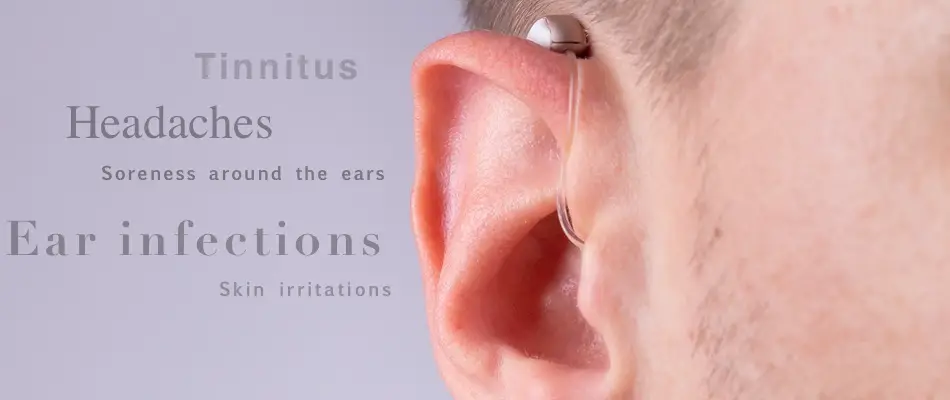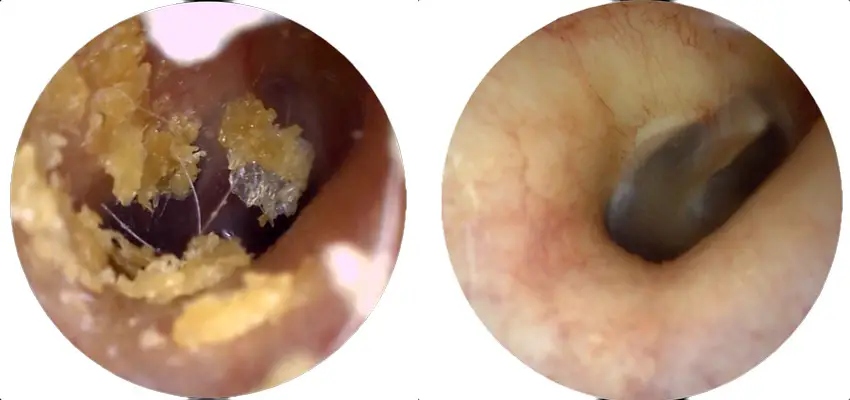In this article, you will learn about the side effects of hearing aids. If you experience side effects with your hearing aids listed below you should seek the advice of your hearing care specialist. In some cases, he or she could perform a small change in regards to the hearing aid adjustment which could minimize the experienced side effects.
Hearing aids side effects
- Tinnitus
- Headaches
- Ear infections
- Soreness around the ears
- Skin irritations
- Increased ear wax production
- Itchy ear canals
- Inability to hear properly in a noisy environment
- Excessive feedback
Do Hearing Aids Cause Headaches?
Headaches caused by hearing aids can occur especially during the phase of getting used to new hearing aids. The hearing aid brings new stimuli to the ear which could not be perceived for a long time. When those sounds are perceived in full needed capacity it is sometimes an overload for the wearer of hearing aids. The headache results from the unfamiliar situation and also makes itself felt like exhaustion.
Those situations oftentimes happen when a lot of people are talking in one room. In such a case the brain of the wearer of hearing aids is not able to filter the important sound information from the unimportant. The result oftentimes is the person with hearing loss understands badly and even puts the hearing aids out.
This of course is not the ideal way. Your hearing aid specialist has options to improve those situations. One of them is acclimatization strategies which improve the level of amplification automatically in a set time period. This way you do not need to visit the office of the audiologist that often and the needed target to compensate your hearing aids best will be met.
When crowded situations do not work well for you as a hearing aid wearer your hearing care specialist has accessories for you. For example, the person talking to you could use a little clip-on microphone. This way you could understand the person you are talking to better and the risk of headaches will be reduced.

Can Hearing Aids Cause Otitis Externa?
A study done by Foster Tochukwu Orji and his team showed using a hearing aid alters the ear canal flora and increases the risk of both fungal and bacterial otitis externa. In addition to increased risk of infections hearing aids oftentimes encourage wax debris formation, with resultant ear irritations.
Can Hearing Aids Cause Ear Infections?
Yes, hearing aids could cause ear infections. They oftentimes limit airflow in the ear canal which alters the ear canal flora and makes the risk of infections higher. Your hearing care professional will tell you about the different options of silicone domes and custom earmolds. Both are available in different options which close up the ears less or more.
It is recommended to clean your hearing aids daily. Use a brush to get rid of ear wax. In addition to that, the earpiece should get disinfection daily to reduce the risk of infections. Cleaning wipes are available to clean your hearing aids and reduce the accumulation of bacteria on the device. To reduce the risk for ear infections as well as possible you could use a little drying box with UV disinfection to make the daily cleaning routine perfect.
Can Hearing Aids Cause Tinnitus?
In seldom cases hearing aids can indeed amplify your tinnitus temporarily. There are different strategies your hearing cares specialist could use to improve the tinnitus with your hearing aids.
A solution would be to use notch noise therapy. In Tinnitus Notch Therapy, the tinnitus frequency is first accurately determined and then filtered out of the hearing aid transmission. No noise is added. Normal hearing aids amplify everything and that also includes the frequency around your tinnitus. This is only one strategy to combat tinnitus induced by hearing aids. Other strategies are melodies that play in the background, sounds of nature, or noisers.
Important here is there is not the only solution for all people. Just tell your hearing care professional about your experience and he or she will be happy to help you out.
Is It Normal to Have an Increased Ear Wax Production With Hearing Aids?
Wearing hearing aids frequently can contribute to more earwax being deposited in the ears. Hearing aids push earwax even deeper into the ear canal when inserted and also prevent it from falling out on its own.
How much earwax forms varies greatly and has nothing to do with hygiene. Men and old people, in particular, tend to accumulate earwax in the ear canal. With age, the composition of the earwax also changes: the earwax glands begin to shrink and release less secretion. The earwax becomes drier, but dead skin particles continue to accumulate. The self-cleaning of the external auditory canal then no longer works as well as in younger people.

Why Do I Have Itchy Ear Canals With Hearing Aids?
Hearing aids sometimes cause itchy ear canals because the domes or earmolds cause irritation by rubbing against the skin. This happens fairly often because as we speak the lower jaw causes small movements of our ear canals. In addition to that hearing aids oftentimes close the ear canal completely which could cause moisture to build up.
More rarely, people are allergic to components of the hearing aid. If your hearing aids are causing your ears to itch, talk to your hearing care professional. He or she will check the fit to make sure your devices fit properly and may be able to use a different material for future earmolds. Oftentimes when the earmold can be placed deeper in the ear canal the movement of the earpiece can be decreased and with it the itching.
If the skin in your ears is dry, your hearing care professional may also recommend using ear drops prior to inserting the hearing aids. Ear drops for itchy and irritated ears can soothe and cleanse your ear. This makes it easier to insert the hearing aids and increases wearing comfort.
